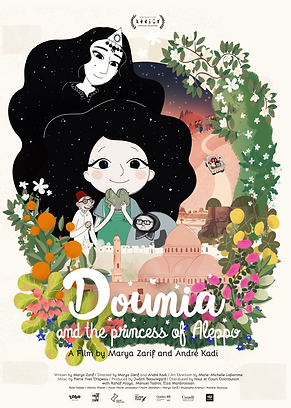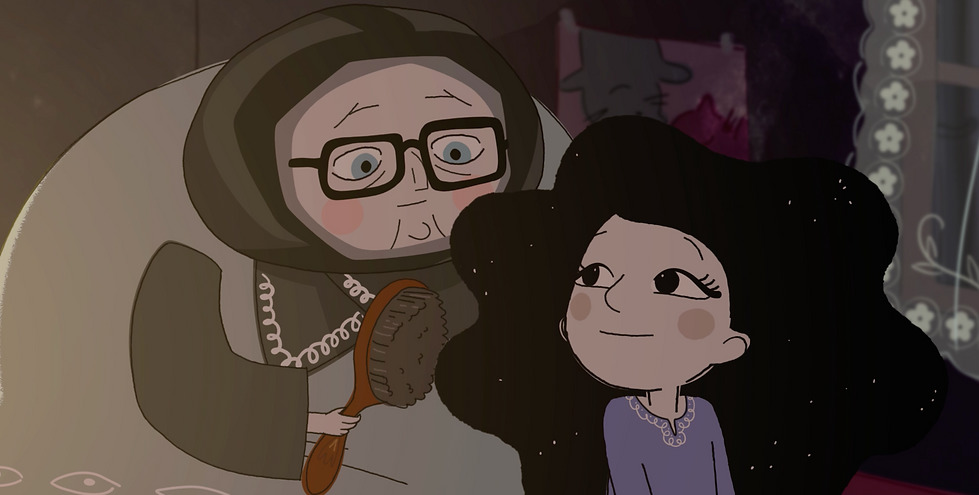
The New York International Children’s Film Festival is North America’s largest and most prestigious film festival for young audiences. The 26th edition runs from March 3rd until the 19th in a variety of venues that include: SVA Theatre, Film Forum, DCTV’s Firehouse Cinema, Scandinavia House, Alamo Drafthouse Brooklyn and Sag Harbor Cinema.
Through this cinematic kermesse, children have the chance to observe stories about communities from a multitude of places and perspectives, and even apprehend about the turmoils of war. For instance, the situation in Syria represents one of the greatest humanitarian crisis of our era, and a dreamy animation such as Dounia & The Princess of Aleppo (Dounia & La Princesse D’Alep), is exceptionally mind-opening as it blends fabulist myth with harsh reality.
Based on the world of Marya Zarif, who co-directed the animation with André Kadi, Dounia & The Princess of Aleppo shows how the life of a six-year old gets turned upside down. However her fortitude and support system allow her to develop a hopeful resilience through the hardships of a diaspora.

The film explores the passing of the seasons. It opens during an August full moon, where on each branch, on each pebble, on each stone, are inscribed the world’s sweetest news. Life in Syria is drenched with poetry and song, as pistachios and rose jam mull the routines of a loving family. Leyla (whose name means light) and her husband Nour (meaning night) are very much in love and give birth to little Dounia whose name represents the world. The young girl grows cherished by her parents, until her mother perishes and joins the King of the Clouds and her father is taken away to prison. Dounia is thus raised by her grandpa Jeddo and her grandma Téta Mouné, who cooks her delights such as mamounieh and teaches her the magical properties of barake seeds, that ward off all evils.
Their days are filled with compassionate neighbours and mundane joy until a gradually intensifying conflict brings a growing troop of soldiers to town. To overcome the ordeal of bombs, Dounia’s grandparents tell her the fairytale of the The Princess of Aleppo, a young woman with a luminous face and hair as shiny as the Milky Way who guards her from the sky.
The situation in Syria gets unbearable because of the war, therefore Dounia and her grandparents have to flee the country. She salutes her young friend Sami, whom she would meet during her wanderings in the citadel. The only thing the little girl takes with her is a handful of nigella seeds, known in Syrian lore to have magical properties.
The journey will be challenging, but the company they keep will be of comfort as they adapt to unexpected changes and events. Those who join them in seeking political asylum are red-haired Lina, with her mother Mrs. Georgette Dabbouss, Abdo and his wife and child, and musician Djwane. They all demonstrate how anxiety and uncertainty related to war can be confronted through togetherness. Dounia and her grandparents traverse land, sea and air, passing from Turkey, Greece and Hungary, to finally arrive to Canada. It’s hard to leave, and find a place to once again call home.

The beautifully stylised animation is brought to life by the sensitive voice cast that feaures: Rachaf Ataya, Elsa Mardorissian, Manuel Tadros, Raïa Haidar, Marya Zarif, Naïm Jeanbart, Mustapha Aramis, Houssam Ataya, Irland Côté. This ensemble emphasises how
a six-year old can withstand monstrous difficulties thanks to familial love and fairytale hope.
Dounia & The Princess of Aleppo is further enriched with cultural references and legends that acquire universal power of inspiration. For instance, a legend is mentioned that can relate to individuals of all ages and nationalities. The story unveils how we all yearn for two opposites: a boat — symbolising travel and freedom — and a tree, the epitome of roots, home, identity. As each individual is torn between these two needs, an understanding arises of how it is the tree that can build the boat, because roots give us the identity to explore the world. There is also a stupendous association to the interconnectedness of our existence through the characters of two wide-eyed statues. Choum and Ay, both aged 5561 years, remind us how stones are the witnesses of humanity’s horrors through the centuries.
The film navigates serious themes through a visually dazzling narrative that explores timely issues and the abiding value of respect for all citizens of the world. Marya Zarif and André Kadi, with a touch of fairytale wonder, shine a light upon one of the most troubling humanitarian emergencies of our era. According to the United Nations more than 6.6 million people have fled Syria since 2011 and another 6 million have moved within the country itself. Dounia & The Princess of Aleppo shares the situation unabashedly with its young spectators, but also leaves them with a feeling of reverie that comes from endurance.
Final Grade: B

